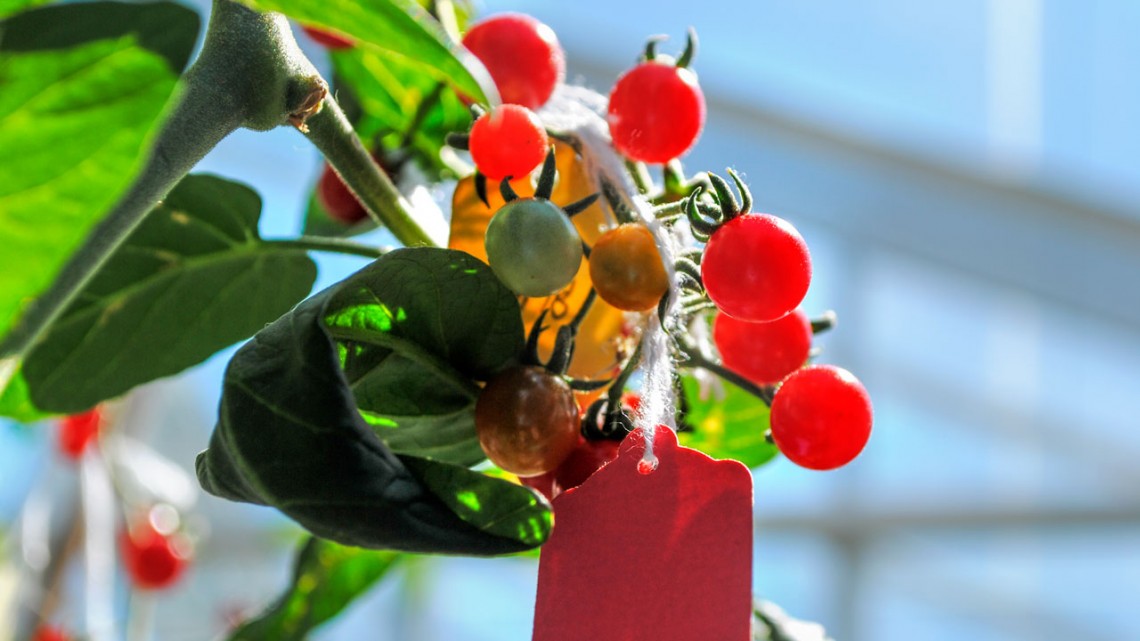
Solanum pimpinellifolium, the predecessor of the modern cultivated tomato.
Tomato could get genetic reboot from wild ancestor
By Aaron J. Bouchie
Thousands of years ago, people in the region now known as South America began domesticating Solanum pimpinellifolium, a weedy plant with small, intensely flavored fruit. Over time, the plant evolved into S. lycopersicum – the modern cultivated tomato.
Although today’s tomatoes are larger and easier to farm than their wild ancestor, they also are less resistant to disease and environmental stresses like drought and salty soil.
Researchers from Boyce Thompson Institute have created a high-quality reference genome for S. pimpinellifolium and discovered sections of the genome that underlie fruit flavor, size and ripening, stress tolerance and disease resistance. Their results were published Nov. 16 in Nature Communications.
“This reference genome will allow researchers and plant breeders to improve traits like fruit quality and stress tolerance in the tomato, for example, by helping them discover new genes in the modern tomato as well as by reintroducing genes from S. pimpinellifolium that were lost over time,” said Zhangjun Fei, co-corresponding author and an adjunct professor in the School of Integrative Plant Science (SIPS) in the College of Agriculture and Life Sciences (CALS).
Although other groups had previously sequenced S. pimpinellifolium, Fei said this reference genome is more complete and accurate, thanks in part to cutting-edge sequencing technologies that are able to read very long pieces of DNA.
“Older sequencing technologies that read short pieces of DNA can identify mutations at the single-base level,” said Shan Wu, a postdoctoral scientist in Fei’s lab and co-corresponding author on the paper. “But they aren’t good at finding structural variants like insertions, deletions, inversions or duplications of large chunks of DNA.”
“Many known traits of the tomato are caused by structural variants, so that is why we focused on them,” Fei said. “Structural variants also are understudied because they are more difficult to identify.”
Fei’s group compared their S. pimpinellifolium reference genome to that of the cultivated tomato, called Heinz 1706, and found more than 92,000 structural variants.
The researchers then combed the tomato pan-genome, a database with the genomes of more than 725 cultivated and closely related wild tomatoes, and discovered structural variants related to many important traits. For example, the modern cultivated tomato has some genomic deletions that reduce their levels of lycopene, a red pigment with nutritional value, and an insertion that reduces their sucrose content.
Jim Giovannoni, a BTI faculty member and co-author of the study, said many consumers are disappointed in the quality and flavor of modern production tomatoes because past breeding efforts ignored those traits in favor of performance and yield.
“Identification of the additional genetic diversity captured in the S. pimpinellifolium genome provides breeders with opportunities to bring some of these important features back to store-bought tomatoes,” said Giovannoni, an adjunct professor in SIPS and a scientist with the U.S. Department of Agriculture’s Agricultural Research Service.
The researchers found many other structural variants that could be of interest to plant breeders, including variants in numerous disease-resistance genes and in genes involved in fruit size, ripening, hormonal regulation, metabolism and the development of flowers, seeds and leaves.
“So much genetic diversity was lost during tomato domestication,” Fei said. “These data could help bring some of that diversity back and result in tomatoes that taste better, are more nutritious and more resilient.”
Other BTI faculty members on the paper include Carmen Catalá, an adjunct assistant professor in SIPS; Gregory Martin, a professor in SIPS; and Lukas Mueller, an adjunct professor in SIPS. Also contributing was Susan Strickler, director of the BTI Computational Biology Center.
The research was supported by the National Science Foundation. Plant material for gene sequencing was provided by the C.M. Rick Tomato Genetics Resource Center at the University of California, Davis.
Aaron J. Bouchie is a science writer at Boyce Thompson Institute.
Media Contact
Get Cornell news delivered right to your inbox.
Subscribe
